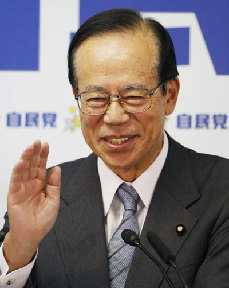Japan's Fukuda picks allies amid calls for election
Updated: 2007-09-24 15:26
 Former chief cabinet secretary Yasuo Fukuda smiles as he speaks at his first news conference after being elected president of the Liberal Democratic Party (LDP) at the headquarters in Tokyo September 23, 2007. [Reuters]
|
Tokyo - Japan's prime minister-to-be Yasuo Fukuda selected his party lieutenants on Monday as he braced for a showdown with a combative opposition and calls for early elections after a disastrous year for the ruling coalition.
The 71-year-old Fukuda, a moderate who favours warmer ties with Asia, was voted leader of the Liberal Democratic Party (LDP) on Sunday after the abrupt resignation of his predecessor, Shinzo Abe, whose administration was crippled by scandals and gaffes.
|
|||
Fukuda will automatically become prime minister on Tuesday thanks to the LDP's huge majority in parliament's lower house.
However, the opposition Democratic Party and its allies hold sway in the upper house, an unusual situation that is likely to beset Fukuda's administration with policy struggles.
The thorniest issue may be Japan's naval support for US-led military operations in Afghanistan, which the LDP wants to continue beyond a November 1 mandate expiry in the face of opposition from the muscle-flexing Democratic Party.
Fukuda, who beat the hawkish Taro Aso to the top job, picked conservative former education minister Ibuki Bunmei, a faction leader and loyal ally in the leadership election, for the number two position in his party, replacing Aso.
Allies in place
Allies Sadakazu Tanigaki, a doveish former finance minister, but also a faction leader, and Toshihiro Nikai were named for the other top party posts. Another Fukuda backer, Makoto Koga, was put in charge of election strategy.
Fukuda denied that the appointments had been made on the basis of factional deals, the LDP's traditional way of operating. "I chose the best people for the positions," he told reporters.
Analysts say the party would have difficulty restoring public trust if Fukuda was seen to be appointing cronies or factional candidates to key cabinet and party positions.
Tanigaki has advocated raising the consumption tax to help tame Japan's huge public debt, and his appointment is a sign that the issue will be at the centre of the new government's policy.
Some analysts have expressed concern that efforts to help those who have lost out economically in restructuring of the past few years could result in a further expansion of government debt.
"We must proceed with reforms, but we have to decide how to deal with those who feel a bit left behind," Tanigaki told a news conference.
One difficulty facing Fukuda is how to deal with Aso himself, a former foreign minister seen by some analysts as having earned recognition for doing better than expected in Sunday's election.
He could be appointed to the cabinet this week, although many commentators say major personnel changes are unlikely because the government wants to push ahead with legislation after a two-week hiatus. Fukuda told reporters on Monday nothing had been decided.
Cronies unwelcome
Although Fukuda has sought cooperation from the Democratic Party, the main opposition group on Sunday repeated its call for an early general election and many newspapers echoed it.
Neither Fukuda nor his predecessor, Abe, have won a mandate in a general election, leaving many voters frustrated that they have not had a chance to express their opinions.
"We want to see constructive policy debate with the opposition. Then the new prime minister must go to the people. This is a six-month stay of execution," said the Tokyo Shimbun.
Apart from the naval mission, Fukuda must also restore the ageing population's trust in the pension system, left in tatters after millions of unidentified premium payments were discovered. Opinion polls have shown the electorate is also deeply concerned about the increasing gap between rich and and poor.
Abe, who was admitted to hospital with a gastro-intestinal disorder exacerbated by stress after his resignation on September 12, was due to give a news conference from hospital later on Monday.
|
|
|
||
|
||
|
|
|
|

